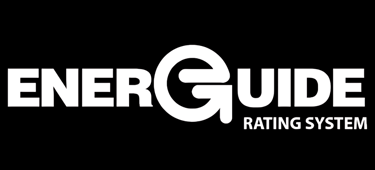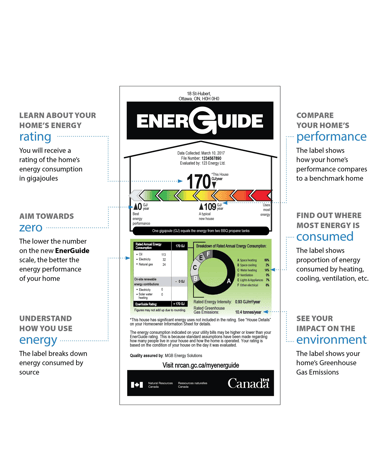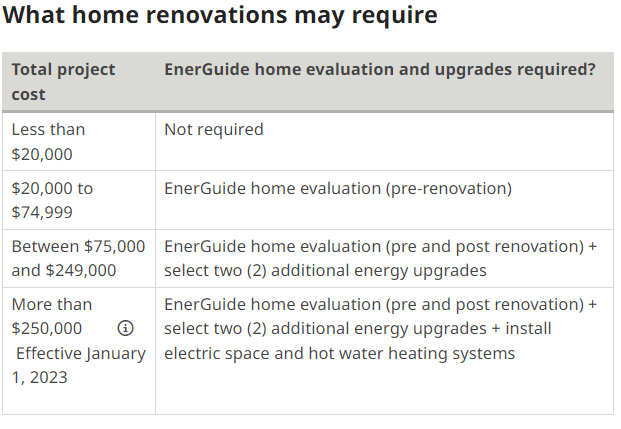
Existing Homes
A home energy evaluation is a perfect way to save money on your utility bills, get money back via home energy rebates, protect the environment and increase the value of your home.
What you receive with an EnerGuide Home Evaluation for your home ?
A Homeowner Information Sheet: A homeowner Information sheet includes detailed information about your home and its energy use.
An EnerGuide Rating and Label: An EnerGuide rating and label displays the energy performance of your home. This is done by estimating the net amount of energy a home utilizes in a year and displays the rated energy consumption in GJ/year per square meter.
A Renovation Upgrade Report: A renovation upgrade report provides a detailed and customized roadmap with recommendations on how to improve your home’s energy performance. This is ideal for existing homeowners who are looking to renovate their home and implement more energy efficient upgrades.


What to expect from your home evaluation?
After you book your appointment, we may call you with a pre-evaluation phone call or email.
Key steps of the evaluation:
The EnerGuide evaluation is carried out by an energy advisor who is registered with Natural Resources Canada and is a representative of the service organization. Your energy advisor will arrive at your home on the date and time you’ve arranged. If you need to cancel or reschedule your evaluation time, be sure to contact your energy advisor.
Before the energy advisor arrives, if you have a wood-burning appliance, please remove any ashes from the fireplace/appliance so that they are not drawn into the house during the blower door test. Also, please clear access to any hard-to-reach areas that the service organization or energy advisor has indicated are important in your pre-evaluation telephone call or email communications.
The energy advisor will have a homeowner consent form for you, the Notice to Homeowner. Read, understand and, if you are comfortable with the terms, sign the form, which is required to authorize the evaluation to take place.
Before getting started, the energy advisor will review the scope, intent and approximate duration of the evaluation, along with the general data collection process. All data and photos collected during the evaluation are strictly protected within the guidelines of all applicable privacy legislation. Photos will be taken of the outside portion of your home, its mechanical systems, the attic space and any wood-burning appliances, if present. These photos are for record keeping and quality assurance purposes only. One photo will be taken of the front of your house to appear in your customized report.
During the evaluation, you and your energy advisor can discuss any plans and priorities you may have relating to energy efficiency upgrades to your home.
If you are interested, the energy advisor will explain tools that are required to complete the evaluation, including the blower door testing equipment that is used to determine the airtightness of your home. If you have questions about any aspect of the evaluation, discuss these with your energy advisor.
The evaluation often begins at the exterior of your home and then moves on to the interior. The energy advisor will measure and collect data about all of the elements of your home that impact its energy performance and then enter that data into an energy simulation software program that calculates your home’s EnerGuide rating. The data collected includes:
the level of your home’s airtightness, using a blower door test;
the insulation levels of your walls, ceilings and basement;
the number, type and location of all windows and exterior doors;
the size and efficiency ratings of your space heating, space cooling (air conditioning) and water heating equipment;
information about any ventilation equipment; and
any other information relevant to your home’s energy performance.
The energy advisor will confirm the locations of attic, basement/crawl space accesses, mechanical equipment, etc. with you in the course of the evaluation. If clear access has not been provided in advance, they may request that you assist in providing safe and unobstructed access to these areas.
If you have fuel-fired space heating or water heating systems, the space heating system will need to be turned down or turned off and the fuel-fired water heating system will need to be turned down to avoid the firing of the equipment during the blower door test. This is because the blower door fan could impact the proper operation of your gas appliances and cause safety issues during the evaluation. All equipment will be returned to pre-evaluation settings at the end of the test.
Please don’t attempt to use your fuel-fired space heating or water heating appliances during the blower door test. For example, please refrain from turning up your furnace thermostat, taking a bath or showering, running the dishwasher or using your clothes washing machine.
During the evaluation, please don’t use any wood-fired or other solid-fuel fired appliances in your home.
Once the evaluation is complete, your energy advisor may discuss with you any related program information, potentially including survey requests. Feel free to ask any questions you have of your energy advisor. If they don’t have certain answers, they can point you in the right direction or follow up with you later.
Before wrapping up, the energy advisor will confirm all relevant information required as part of their data collection. The following are required items you can prepare in advance of the evaluation:
Your municipal property tax roll number to confirm ownership of the home;
If appropriate, all paid invoices and receipts for goods and services related to your energy efficiency upgrades. These would be necessary if you are participating in a rebate or incentive program that includes a post-retrofit sevaluation and requires evidence of the upgrades you’ve undertaken.


City of Vancouver REUP
Renovation Energy Upgrade Proposal Checklist
City of Vancouver's Building Bylaw requires anyone completing renovations over $20,000 to get an EnerGuide home evaluation from a Certified Energy Advisor (CEA) as part of the REUP program.
If you need an EnerGuide home evaluation to secure your City of Vancouver renovation permit, contact us for a quote.


About Us
The designation of energy advisor (EA) registered with Natural Resources Canada (NRCan) means that a person has met and maintained all of the required qualifications to deliver EnerGuide rating services for eligible homes in Canada. An NRCan-registered EA can also add other NRCan services to their qualification. Energy Advisors provide third party expert advice to builders and homeowners who wish to use the EnerGuide Rating System in the design stages of new construction or during renovation stages.
Ecosteps Energy is committed to reducing the the carbon footprint of Homes through building science and energy efficiency. Our Energy Advisors have a passion for energy efficiency and are qualified to work on your new or Existing home.

Get in touch
Contact Us
Metro Vancouver, Surrey, Delta, Richmond, Langley, Abbotsford, Chilliwack, Mission, Maple Ridge, Coquitlam, Port Moody, Burnaby, North and West Vancouver, Squamish, Whistler, Pemberton, Kelowna, Kamloops
